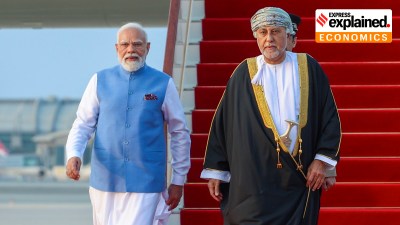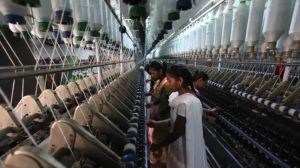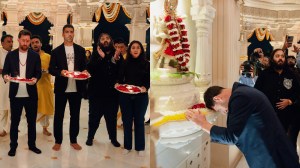The Coordinating Committee on Manipur Integrity (COCOMI), which has emerged front and centre over the last three months negotiating on behalf of the Meitei community in the ongoing conflict, was formed four years ago in response to the Indo-Naga peace talks, amidst fears that the settlement would involve breaking up the state of Manipur.
Manipur had witnessed major protests through October and November 2019, amid expectations that a final agreement would be arrived at from the protracted peace talks between the Union Government and Naga groups, which concluded on October 31, 2019. The protests were spearheaded by a newly formed conglomerate of five major Meitei civil society organisations called COCOMI.

This was to be a united front for the “integrity of Manipur” with the aim of fighting to ensure that the final settlement would not affect the territory of Manipur. The Nagas are one of the three major ethnic groups of Manipur – along with the Meiteis and the Kuki-Zomis – and are in majority over a significant part of the state’s hilly areas. The demand for unification of Naga-inhabited areas of Manipur, Assam, Arunachal Pradesh and Myanmar along with Nagaland into a Naga “homeland”, had led to anxiety among the Meitei community that the final settlement would “disintegrate” Manipur.
In that agitation, the COCOMI had launched a series of protests and met with Union Home Minister Amit Shah in Delhi for an assurance that the final Naga settlement “will not affect the territorial integrity and administrative set up of Manipur”.
However, the COCOMI soon found common cause with the United Naga Council – the apex body of Nagas in Manipur – in demanding the implementation of an NRC (National Register of Citizens) in the state, alleging continuous illegal immigration – particularly from neighbouring Myanmar to the state’s Kuki-dominated districts – and joined hands over the issue in 2022. Following pressure by these two groups, the Manipur Legislative Assembly that year passed two private member resolutions to establish a population commission in the state and implement an NRC.
This demand continues to be stressed on by the COCOMI, including through the course of the ongoing violence in the state, with the group insisting that illegal immigration is the root cause of the socio-political unrest in the state.
In the early days of the current phase of violence that began in May, the group was most visible carrying relief material to the camps that had mushroomed across the valley to house Meiteis who had been displaced from Kuki-dominated areas, or who had moved away from peripheral areas that had begun to emerge as persistent sites of conflict.
Story continues below this ad
“In the beginning, we thought it was just a communal clash and the focus was on relief and evacuating victims. But the agitation began to change. Militants were firing at villagers in the valley with sophisticated weapons, while groups like the ITLF (Indigenous Tribal Leaders’ Forum) keep pushing for a division in the state. The situation compelled us to change ourselves and defend,” claims Dhananjoi Ammik, a COCOMI leader.
In early June, the COCOMI created ripples in the conflict by “declaring war against narco-terrorism” in the state at a ‘People’s Convention’ organised by it. Later in June, the Union government constituted a peace committee comprising different stakeholders, which never took off because representative groups on both sides declared that it would not participate in it.
COCOMI convenor Jeetendra Ningomba had also been listed as one of the members, but the group declared that it “rejected” his appointment, as it was dissatisfied with the government’s handling of “narco-terrorism” and illegal immigration.
While over the last few months, the group’s visibility has largely been in pushing for demands such as an NRC and rejection of separate administration for Kuki-dominated areas through various means, including meeting with Union Home Minister Amit Shah in Delhi and calling for “boycott” of the state government, earlier this month, it was in the thick of the conflict when thousands gathered at the Bishnupur-Churachandpur districts in response to its call.
Story continues below this ad
It had issued a call to “push back” security barricades at Phougakchao Ikhai towards Kuki-Zomi dominated Churachandpur on September 6, with the stated aim of enabling the Meiteis, who had fled from Torbung – on the border of the two districts – to return to their homes. The gathering turned violent — armed members of the mob fired at security personnel and several people were injured when the security forces retaliated by deploying the use of tear gas. However on Thursday, following public pressure, the Manipur Police announced that the barricades had been removed.
Most recently, the group submitted a memorandum to the Union Defence Minister, reiterating demands which have been raised through the course of the conflict by various Metiei stakeholders, including the replacement of the Assam Rifles in the state by some other security force, and the abrogation of Suspension of Operation agreements with Kuki groups.
This is not the first time that the COCOMI has raised some of the demands with a Union Minister. In June too, it had submitted a demand that the Assam Rifles be withdrawn from the state. The run-ins of Meitei groups with the security force had even resulted in an FIR over defamation and sedition against the COCOMI in July, based on a complaint filed by the Assam Rifles. The key allegations made in the FIR had included exciting people against a government agency, promoting enmity between different social groups, defaming the Assam Rifles and causing hindrance to its personnel in discharging their duties.

































